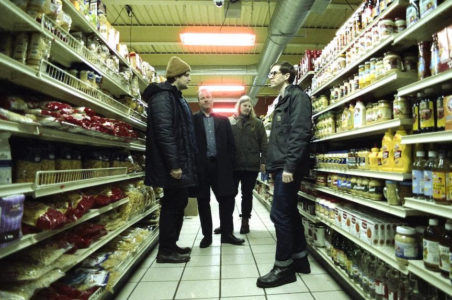
5.5
Always Ascending
Franz Ferdinand
As an album, Always Ascending is a frustrating experience. Its songs feature protagonists who suffer disappointment, loneliness, and rejection. Behind those danceable hooks and Alex Kapranos’ signature baritone is a collection of tracks that seem to depict a fading frontier, borrowing from genres that have long since been in their heyday. It’s an apt metaphor for a band that has seen better days, and while Always Ascending is often enjoyable, it’s not quite enough to lift Franz Ferdinand out of their late-career malaise.
The album opens with a modern take on “I Can’t Get No Satisfaction” in “Always Ascending,” as Kapranos deadpans the verse before a call and response chorus kicks in: “never gonna resolve / never gonna resolve.” True to their word, the band never fully realises the song’s potential, as it repeats itself ad nauseum before a blooming synth seems to lead up into the clouds. “Lazy Boy” is just as impotent: “I’m gonna get up / Get up never.” The disco flair and New Order beats are enjoyable but skin deep, and Kapranos, never the most expressive vocalist, doesn’t give these songs the hard sell they need. “Paper Cages” seems to reach the logical limit of these songs’ frustration, as neon synths and jazzy pianos slink around limply. Like the song’s protagonist, the album seems to long to step out of its cage, but seems unable to.
All of which makes “Finally,” the album’s first real triumph, so successful. It’s the first ray of sunshine yet, as Kapranos delights in belonging: “Finally I found my people / Found the people that were meant to be found.” Maybe it’s because this song is closer to the post-punk of the band’s early years that it works so well, but the confident strut of the verse and funky chorus injects some sunshine into what’s so far been a dreary and cloistered album. In an album that often seems remarkably opaque, it’s a breath of fresh air.
The following sequence of tracks return us to equilibrium. “The Academy Award” hinges on a weak metaphor to make a point about the lies we tell ourselves, while “Lois Lane” is a character study of the fictional journalist that leaves out the Man of Steel. Its refrain, “At the over 30s singles night / It’s bleak,” is almost too pat of a description of the album and the band behind it. “Huck and Jim” is inventive but messy, as a sinister guitar churn leads loosely between musical motifs as Kapranos tells us that “there is no down / something’s gone and you’re missing it now.” Things pick up a little in the image-obsessed “Glimpse of Love,” which tells the story of a model in love with her own reflection. It’s catwalk-ready and danceable, avoiding the doom and gloom of many of the album’s tracks.
The second high water mark of the album comes in “Feel the Love Go,” which pairs a Kraftwerkian backbeat with a delightful saxophone solo and a catchy refrain that matches the album’s depressing tone without being too depressing itself. The album’s closer, in comparison, is anticlimactic, reaching for a level of gravitas the band hasn’t earned. It demands too much from Kapranos as a vocalist and ticks away at too low a speed: this is not a band that can pull off a ballad, at least not anymore.
Always Ascending is not without its highlights, but its repeated attempts at relevance fall short. You wouldn’t refuse to dance to this music at a party or a concert, but it’s not going on anyone’s mixtapes anytime soon.
Words by Max James Hill
Latest Reviews
Tracks
Related Albums
Related News
Advertisement
Looking for something new to listen to?
Sign up to our all-new newsletter for top-notch reviews, news, videos and playlists.














